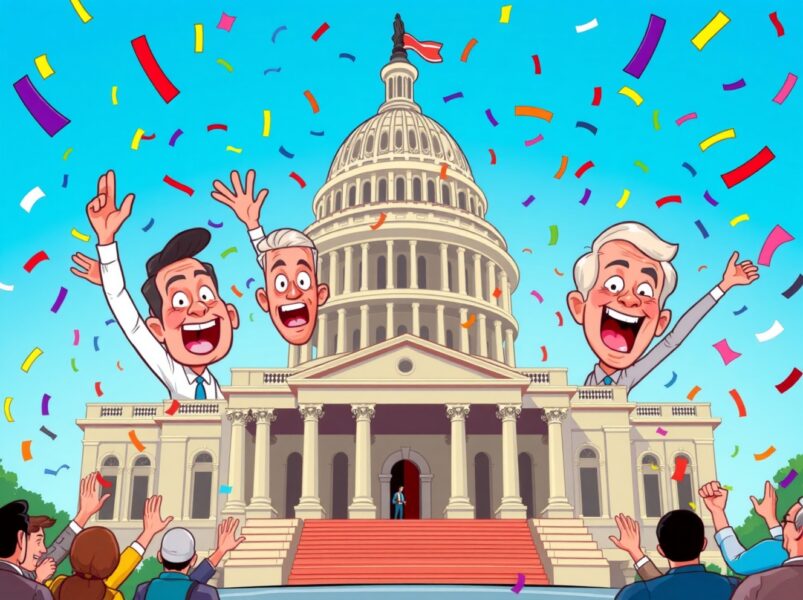Nvidia (NVDA) Stock: Company Approaches Historic $5 Trillion Market Value on Massive Chip Orders
TLDR
- Nvidia is set to become the first company to reach a $5 trillion market valuation after shares jumped 3.1% in premarket trading.
- CEO Jensen Huang announced over $500 billion in orders for the company’s Blackwell and Rubin AI chips at the GTC conference.
- The company plans to build seven supercomputers for the U.S. government as part of its expansion.
- Wall Street analysts say the $500 billion order figure points to stronger earnings potential than current forecasts suggest.
- Nvidia has gained nearly 50% year-to-date and analysts maintain a Strong Buy consensus rating with an average price target of $225.
Nvidia shares surged 3.1% in premarket trading on Wednesday, pushing the company toward a historic $5 trillion market valuation. This would make it the first company ever to reach this milestone.
NVIDIA Corporation, NVDA
The rally came after CEO Jensen Huang dropped a bombshell at the company’s semi-annual GTC conference in Washington, D.C. He revealed that Nvidia has secured more than $500 billion in orders for its upcoming Blackwell and Rubin AI chips.
Huang also announced plans to build seven supercomputers for the U.S. government. He described demand for the next-generation AI processors as “exceptionally strong.”
The stock has now gained nearly 50% year-to-date. The company previously hit a $4 trillion valuation in July.
A $5 trillion market value would exceed the entire cryptocurrency market. It would also equal about half the total value of the pan-European Stoxx 600 index.
Analysts See Room for More Growth
Wall Street analysts jumped on the news, with several raising their outlook. Wolfe Research analyst Chris Caso maintained an Outperform rating with a $230 price target.
Caso estimates Nvidia may ship $500 billion worth of Blackwell and Rubin chips in calendar years 2025 and 2026. His current forecast sits at about $360 billion for the same period.
That gap could add roughly $140 billion in data center revenue. It could also boost earnings per share by around $3 in 2026.
Cantor Fitzgerald analyst C J Muse kept his Overweight rating and $300 price target. He argued that Wall Street’s current earnings estimates remain “way too low.”
Muse noted that even with concerns about an “AI bubble,” Nvidia trades at roughly 21 times its projected 2026 EPS of $9 to $10. He called the stock “too inexpensive to ignore.”
The Blackwell chip is expected to launch later this year. Rubin, due in 2026, will build on Blackwell’s design to extend the company’s lead in data center and AI computing.
Playing the Geopolitical Game
The company’s dominance has attracted global regulatory attention. U.S. export curbs on advanced chips have made Nvidia a key piece in Washington’s strategy to limit China’s access to AI technology.
The Santa Clara, California-based company has transformed from a niche graphics-chip maker into the backbone of the global AI industry. It has vaulted past Apple, Microsoft, and Alphabet in market value.
Its H100 and Blackwell processors power most large language models behind tools like OpenAI’s ChatGPT and Elon Musk’s xAI. Both Apple and Microsoft have also topped $4 trillion in market value.
Rivals including Advanced Micro Devices and several well-funded startups are trying to challenge the company’s dominance in high-end AI chips. But Nvidia remains the industry’s top choice.
The company’s massive weighting in the S&P 500 and Nasdaq 100 gives it outsized influence over global markets. Some analysts warn of overheated valuations, noting that the towering market cap raises expectations and leaves little room for disappointment.
On TipRanks, Nvidia stock has a Strong Buy consensus rating based on 35 Buys, one Hold, and one Sell rating. The average price target of $225 implies nearly 12% upside potential from current levels.
Nvidia is scheduled to report quarterly results on November 19.
The post Nvidia (NVDA) Stock: Company Approaches Historic $5 Trillion Market Value on Massive Chip Orders appeared first on CoinCentral.
You May Also Like

Aster has announced the launch of its fourth phase of airdrops, allocating 1.5% of the total supply.

Analysis: RSI is trending towards a rebound, while ETF fund flows are cautious; the sustainability of Bitcoin's rebound remains to be seen.
